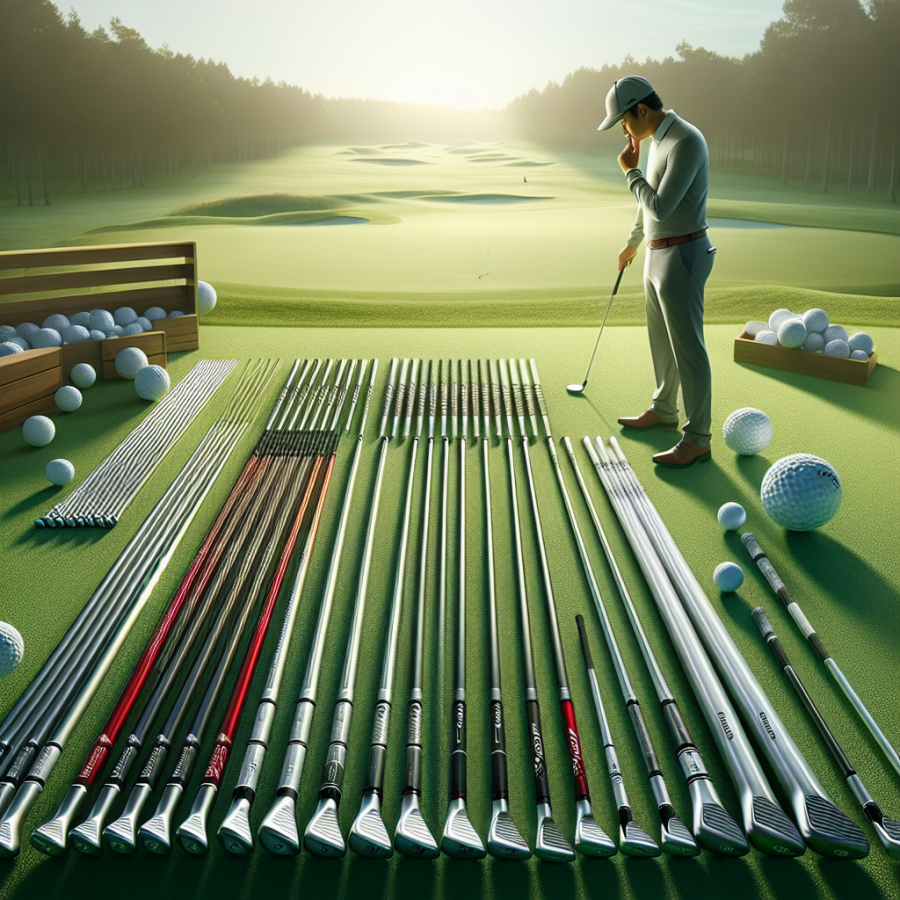Understanding the Importance of Choosing the Right Golf Shaft
Choosing the right golf shaft is just as critical as choosing your club heads. Most golfers, especially beginners, often overlook this aspect and focus more on club heads. However, your golf performance and overall swing greatly depend on the type of shaft you use.
Understanding the Golf Shaft
The golf shaft is the engine of your golf club. It connects the golfer's hands to the clubhead and significantly impacts the club's overall performance. It affects swing speed, trajectory, distance, feel, and even accuracy. That's why the shaft selection can truly make or break your game.
Shaft Flex
In choosing the right golf shaft, one of the critical factors to consider is the shaft flex. The flex refers to the amount a shaft will bend during a swing. There are five primary categories of shaft flex: Ladies (L), Senior (A), Regular (R), Stiff (S), and Extra Stiff (X). If you have a fast swing speed, a stiffer flex may suit you best. In contrast, slower swing speeds may perform better with more flexible shafts.
Shaft Material
Shaft material is another essential factor that golfers should consider. Most shafts are made of either steel or graphite. Steel shafts are heavier, providing more control, which can be beneficial for golfers with faster swing speeds. Graphite shafts, on the other hand, are lighter, enabling greater distances to be achieved. However, they offer less precision than their steel counterparts.
Shaft Length
The length of your golf shaft is crucial in achieving the correct posture and maximizing swing speed. A shaft that's too short or too long can lead to inconsistent strikes and potentially even cause discomfort or injury in the long term. The perfect shaft length for you will primarily depend on your height and the length of your arms.
Shaft Weight
The weight of the golf shaft can greatly impact a golfer’s ability to control and swing the club. Lighter shafts can increase swing speed but may reduce control. Heavier shafts can offer more control but may decrease swing speed. Therefore, the ideal shaft weight varies from player to player based on individual comfort, control, and speed.
Shaft Torque
Shaft torque refers to the amount of twist in a shaft during a golf swing. A shaft with high torque rating twists more than a shaft with a lower rating.
Read also:
Michigan's Fierce Octagon Warriors: Rising MMA Talents
Key Factors to Consider in Selecting the Ideal Golf Shaft for Your Game
Selecting the ideal golf shaft for your game is a critical aspect of improving your golf performance. A golf shaft that complements your gaming style can remarkably enhance your precision and distance on the golf course. However, this decision is not a mere walk in the park. It involves enquiring into key factors that would guide your selection.
The first crucial factor to consider is the material of the shaft. The golf shaft's material significantly impacts the flexibility, weight, and feel of the golf club. Generally, there are two common materials used in the manufacture of golf shafts: steel and graphite. Steel shafts are heavier and offer more control, making them suitable for golfers with fast swings. On the other hand, graphite shafts are lightweight, promoting greater distance but less precision.
Secondly, it is essential to consider the flex of the shaft. Flex, in simple terms, refers to the amount of bend in the golf shaft. Shafts come in different flex ratings, including extra stiff (X), stiff (S), regular (R), senior (A), and ladies (L). The speed and mechanics of your swing should guide your choice of flex. For instance, a golfer with a fast swing speed would benefit more from a stiff or extra stiff shaft, while those with slower swing speeds would find a regular, senior, or ladies flex shaft more suitable.
The length of the shaft is another critical factor that should not be overlooked. The shaft length affects the club's swing weight and the ability to control the club during your swing. Generally, tall golfers require longer shafts, while short golfers might find shorter shafts more comfortable. It's advisable to have your golf clubs fitted by a professional to ensure the shaft length complements your height and swing style.
The torque of the shaft is also an essential consideration when choosing a golf shaft. Torque refers to the amount of twisting that occurs in the shaft during your swing. Lower torque shafts are typically more rigid and offer better control, while high torque shafts tend to be more flexible and provide greater distance.
Lastly, the kick point or bend point of the shaft can significantly influence ball flight. This refers to the point along the shaft where it demonstrates the most bending during a swing. Shafts with high kick points bend closer to the grip and typically result in lower ball flights, while those with low kick points bend closer to the clubhead, leading to a higher ball flight.




